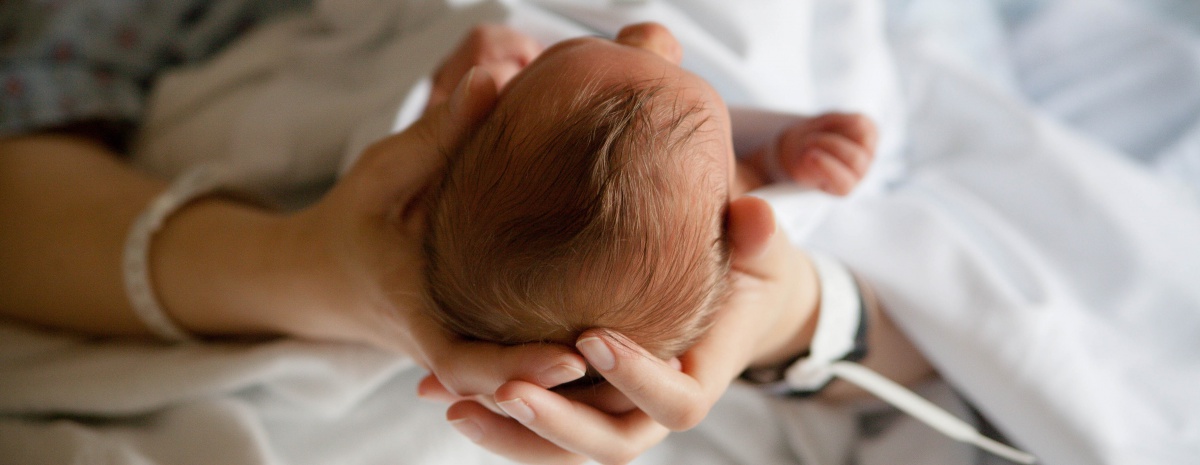Overview
Pregnancy and Opioid Exposure: A Training Course to Increase Understanding at Four Key Points of Intervention

A variety of life experiences can lead to opioid-exposed pregnancies. Some of the more common pathways include:
Women* in recovery who are taking methadone or buprenorphine as medication for opioid use disorder (MOUD).
Women who are taking opioids prescribed by a provider for the treatment of chronic or acute pain.
Women with active opioid use disorders who may or may not be receiving opioids through medical means, including those who use heroin.
This training course explores the role of gender in the development of opioid use disorders and examines evidence-based practices and available resources that support improved outcomes for pregnant and parenting women who use opioids and other substances, and their children, at four key points of intervention: Pre-pregnancy, Prenatal, Birth, and Postnatal.1
Throughout this training course, behavioral health and healthcare professionals currently working in the substance use disorder treatment field explore the heightened stigma surrounding pregnant women who use substances including opioids, and provide insight on how to best serve this population.
Module 1: Pregnancy and Opioid Exposure 1: Pre-pregnancy
Module 2: Pregnancy and Opioid Exposure 2: Prenatal
Module 3: Pregnancy and Opioid Exposure 3&4: Birth and Postnatal
1. Substance-Exposed Infants: State Responses to the Problem. (n.d.). 95.
*Individuals with the anatomy to become pregnant may not identify or present as female. It is important to provide the same level of care for all individuals who may become pregnant including those who may be taking opioids during pregnancy.
Target Audience
Behavioral Health professionals including Social Workers, Addiction Specialists, Counselors, Peer Support Specialists, and other Human Services professionals who would like to increase their understanding of pregnancy and opioid exposure.
Modality
This course consists of 3 online self-paced modules, each approximately 2 hours in length. Participants must complete all 3 modules, their respective end of module quizzes, a pre-test, a post-test, and a course evaluation to receive a certificate of completion. This course takes approximately 6 hours to complete.
Policies and ADA Accessibility
If you require any of the auxiliary aids or services identified in the Americans with Disabilities Act in order to participate in this program, please call us at (919) 843-6083, or e-mail us at bhs-support@unc.edu. Websites and courses have been developed in compliance of US Section 508 standards where applicable or meeting W3C priority 1 guidelines for web accessibility.
Please send all questions, concerns, and support inquiries to bhs-support@unc.edu.
Training Details
Module 1: Pregnancy and Opioid Exposure 1: Pre-pregnancy

The Pre-pregnancy timeframe offers the opportunity to promote awareness of the effects of prenatal substance use among women* of childbearing age and their family members.1 This module consists of eleven lessons that explore: the prevalence of substance use and substance use disorders across the population; the unique needs of women who use substances including opioids, and those diagnosed with, or at risk of, developing an opioid use disorder (OUD); gender differences in the development of substance use disorders including opioid use disorders; the role of adverse childhood experiences (ACEs) in development of substance use disorders; treatment approaches for substance use disorders; substance use stigma as a barrier to care; and strategies to support collaboration across behavioral health and healthcare professions.
1. Substance-Exposed Infants: State Responses to the Problem. (n.d.). 95.
*Individuals with the anatomy to become pregnant may not identify or present as female. It is important to provide the same level of care for all individuals who may become pregnant including those who may be taking opioids during pregnancy.
Learning Objectives
Participants will be able to:
- Define substance use disorder (SUD)
- Describe two gender differences in the development of an SUD
- Describe three circumstances in which women may be taking opioids
- Explain the role of ACEs in the development of an SUD
- Recall three benefits of medication for opioid use disorder (MOUD) for pregnant women with an OUD
Module 2: Pregnancy and Opioid Exposure 2: Prenatal

The prenatal intervention point focuses on the importance of screening pregnant women* for substance use as a part of routine prenatal care and making referrals that facilitate access to treatment and related services if needed.1 This module consists of eleven lessons that explore: the prevalence of substance use and polysubstance use during pregnancy; pregnancy and opioid exposure; SBIRT in the prenatal setting; neonatal opioid withdrawal syndrome (NOWS); preparation for labor and delivery and breastfeeding; safe sleep; amplified stigma as a barrier to care and strategies to support collaboration across behavioral health and healthcare professions.
1. Substance-Exposed Infants: State Responses to the Problem. (n.d.). 95.
*Individuals with the anatomy to become pregnant may not identify or present as female. It is important to provide the same level of care for all individuals who may become pregnant including those who may be taking opioids during pregnancy.
Learning Objectives
Participants will be able to:
- Define polysubstance use and recall relevant statistics regarding polysubstance use during pregnancy
- Recall and describe the possible physical effects of tobacco, alcohol, and cannabis (marijuana*) on a developing baby when used during pregnancy
- Describe three common pathways leading to opioid-exposed pregnancies
- Describe the possible physical effects of an active opioid use disorder on a developing baby
- Define neonatal opioid withdrawal syndrome (NOWS) and describe the evidence-based Eat, Sleep, Console (ESC) treatment approach
*Marijuana is the term SAMHSA uses to refer to cannabis.
Module 3: Pregnancy and Opioid Exposure 3&4: Birth and Postnatal

Interventions during this timeframe incorporate testing newborns for substance exposure at the time of delivery, developmental assessment, and emphasis on the corresponding provision of services for the newborn and mother* as well as the family immediately after the birth event.1 This module consists of six lessons that explore: newborn identification testing; North Carolina's Plans of Safe Care (POSC) for infants with prenatal substance exposure; the science behind medications for opioid use disorder (MOUD) and breastfeeding, the benefits of postpartum recovery support, reducing the risk for sudden infant death syndrome (SIDS) or sudden unexplained infant death (SUID); and strategies to support collaboration across behavioral health and healthcare professions.
1. Substance-Exposed Infants: State Responses to the Problem. (n.d.). 95.
*Individuals with the anatomy to become pregnant may not identify or present as female. It is important to provide the same level of care for all individuals who may become pregnant including those who may be taking opioids during pregnancy.
Learning Objectives
Participants will be able to:
- Recall 3 risk factors that may be included in risk-based biomedical testing guidelines for newborns
- Describe the goals of North Carolina's Plan of Safe Care
- Recall factors that impact medication in breastmilk
- Recall recommendations for providing patient-centered postpartum support
- Recall the American Academy of Pediatrics (AAP) recommendations lowering risk for sudden infant death syndrome (SIDS)
- Describe North Carolina's service system in place to serve children and families impacted by developmental delays or disabilities
Register

- Please be sure to be logged on to the BHS site.
- Click the button below "Take Me to the Course" to enter the course. The course will open in a new tab.
- You can always re-visit the course by visiting your "My Courses" tab on your account page.
Presenter
 Melissa L. Godwin, LCSW is a clinical social worker who has a Clinical Associate Professor appointment at UNC Chapel Hill School of Social Work. She has provided women’s gender-responsive substance use disorder services technical assistance and training in North Carolina since 2004 under a contract with the North Carolina Division of Mental Health, Developmental Disabilities, and Substance Abuse Services.
Melissa L. Godwin, LCSW is a clinical social worker who has a Clinical Associate Professor appointment at UNC Chapel Hill School of Social Work. She has provided women’s gender-responsive substance use disorder services technical assistance and training in North Carolina since 2004 under a contract with the North Carolina Division of Mental Health, Developmental Disabilities, and Substance Abuse Services.
Ms. Godwin obtained her Bachelor of University Studies at the University of New Mexico in Albuquerque and her Masters in Clinical Social Work from Boston University.
Continuing Education
UNC SSW, 1406, is approved to offer social work continuing education by the Association of Social Work Boards (ASWB) Approved Continuing Education (ACE) program. Organizations, not individual courses, are approved as ACE providers. State and provincial regulatory boards have the final authority to determine whether an individual course may be accepted for continuing education credit. UNC SSW maintains responsibility for this course. ACE provider approval period: 8/10/22-8/10/25. Social workers completing this course receive 6 general continuing education credits.
UNC SSW has been approved by NBCC as an Approved Continuing Education Provider, ACEP No. 6642. Programs that do not qualify for NBCC credit are clearly identified. UNC SSW is solely responsible for all aspects of the programs. The successful completion of this online course qualifies for 6 contact hours.
This course is approved by the North Carolina Addiction Specialist Professional Practice Board for 6 SS contact hours. Approval # 25-219-S


